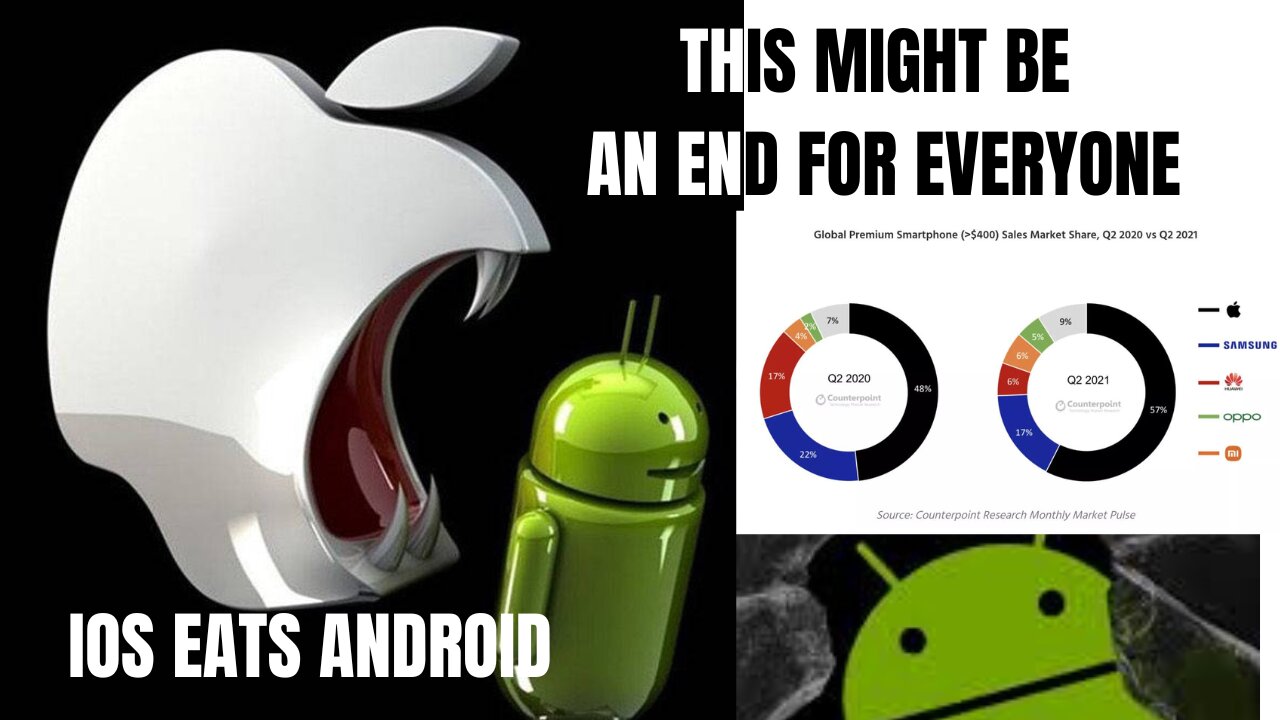Premium Only Content

iPhone vs Android or iPhone itself?
In the dynamic world of mobile phones, the market is divided into two major categories: iPhones and Androids. While iPhones are exclusively manufactured by Apple, Android phones are produced by numerous companies, creating a diverse landscape. However, Apple's iPhones have consistently held the top position in terms of sales, surpassing all other competitors over the past four years.
This video delves into the reasons behind Apple's success and the implications it may have on the smartphone market. Apple's key strategy lies in its unwavering commitment to fulfilling consumer needs. Rather than solely focusing on hardware, Apple emphasizes the services and experiences their products provide, creating a personalized and satisfying user journey.
One of the standout features of iPhones is their fast processors, which offer superior performance compared to most Android phones. Apple's seamless integration of hardware and software optimizes efficiency and effectiveness, resulting in devices that work faster, smoother, and more efficiently than their competitors.
Another significant aspect is Apple's consistent release of major software updates. Every year, iPhone users gain access to exciting new features and updates through new versions of iOS, all free-of-charge. This commitment to continuous improvement ensures that iPhones get better with time, offering an enhanced user experience year after year.
Apple's focus on performance extends beyond software updates. iPhones consistently outshine their Android counterparts, even older models exhibit excellent performance and smooth functioning. With ample internal storage and optimized hardware, iPhones create a seamless and magical user experience that sets them apart.
Moreover, today's consumers are increasingly obsessed with camera and photography capabilities. The iPhone's camera has been a game-changer for smartphone photography, empowering users to capture stunning images and videos with ease. From advanced sensors to computational photography techniques, Apple continues to push the boundaries of what is possible in mobile photography, further enhancing the appeal of iPhones.
While Apple's success is evident, it is essential to consider the potential consequences if Apple were to dominate the entire market. If this scenario unfolds, consumers may face limited choice, as other companies struggle to compete. This could result in a lack of diversity in design, features, and price ranges, ultimately reducing the options available to consumers.
Furthermore, without competition, Apple may have the ability to set higher prices for iPhones, limiting price flexibility for consumers. Reduced competition also poses the risk of stifling innovation, as the incentive for Apple to invest heavily in research and development may decrease. This could slow down advancements in smartphone technology and result in fewer breakthroughs for the industry.
Moreover, a market dominated solely by iPhones could lead to potential stagnation. Without the pressure of competition, Apple may become complacent and less motivated to introduce significant improvements or disruptive technologies. This could result in fewer advancements and less excitement for consumers.
Additionally, Apple's closed ecosystem and strict control over hardware and software integration may become more pronounced in a market where iPhones dominate. This could limit customization options for users, restricting their ability to personalize their devices according to their preferences.
The impact of Apple's dominance would also be felt by Android manufacturers, who would face significant challenges. Companies relying on the Android operating system would experience reduced market share, potentially leading to consolidation, mergers, or even exit from the smartphone market.
Lastly, a situation where iPhones take over the entire market may attract regulatory scrutiny. Government bodies might investigate Apple's market dominance and assess whether the company has engaged in anti-competitive practices. This could result in legal actions, regulations, or interventions aimed at ensuring a more competitive market environment.
In this video, we explore the current trend in phone sales, Apple's key offerings, and the potential consequences of Apple's market dominance. Join us as we delve into the evolving smartphone landscape and discuss the importance of a healthy and competitive market for the benefit of consumers and the industry as a whole. Don't miss out on this insightful analysis. Watch now and stay informed about the future of mobile phones.
-
 1:03:27
1:03:27
The Rubin Report
2 hours agoThe Exact Moment Bernie Has His Socialist Dream Crushed Into Dust
31.5K25 -
 1:56:59
1:56:59
Steven Crowder
4 hours agoTrump Keeps Winning | Rosie Flees, Ukraine Ceasefire Deal, Canada Backs Down & So Much More
309K212 -
 1:25:07
1:25:07
The Big Mig™
5 hours agoActBlue, the Democratic Fund-Raising Theft & Corruption
12.8K6 -
 52:52
52:52
Grant Stinchfield
1 hour agoTwo Illegals Accused of Killing a Man Over a Car Part... After Being Arrested 27 Times!
6.59K -
 34:27
34:27
Tudor Dixon
3 hours agoRacing into Politics with Danica Patrick | The Tudor Dixon Podcast
7.09K2 -
 1:04:00
1:04:00
Timcast
3 hours agoDemocrat IMPEACHMENT Campaign Against Trump BEGINS As Party Collapses, Voters QUIT Party | Timcast
81.2K55 -
 1:47:17
1:47:17
Benny Johnson
2 hours ago🚨 PANIC in DC: Feds Caught Shredding Docs, Trump Demolishes Department Of Education | Economy ROARS
52.9K56 -
 2:59:28
2:59:28
Wendy Bell Radio
8 hours agoBurn It All Down
102K54 -
 DVR
DVR
Bannons War Room
22 days agoWarRoom Live
5.55M1.2K -
 2:45:44
2:45:44
Matt Kohrs
14 hours agoBREAKING CPI INFLATION REPORT!!! || The MK Show
64.7K3